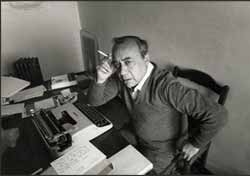Leonardo Sciascia
 At Two Riversides, we give much attention to the relationship between literature and cinema. During the first edition we observed the romance between cinema and literature in the work of Jiří Menzel based on the prose of Hrabal. During the trip to Italy, the film-literary hero will be Leonardo Sciascia. This poet and Sicilian prose-writer portrays modern Italy in a unique way. In his stories we get to know everyday life in this country, and in this mundane context we can find a socio-political philosophical analysis. His novels seem to be ready-made film scripts, and for that reason they have been screened so often.
At Two Riversides, we give much attention to the relationship between literature and cinema. During the first edition we observed the romance between cinema and literature in the work of Jiří Menzel based on the prose of Hrabal. During the trip to Italy, the film-literary hero will be Leonardo Sciascia. This poet and Sicilian prose-writer portrays modern Italy in a unique way. In his stories we get to know everyday life in this country, and in this mundane context we can find a socio-political philosophical analysis. His novels seem to be ready-made film scripts, and for that reason they have been screened so often.
Apart from a debate on his work with Polish poets and writers, we will also see a selection of his films which are based on the prose of Leonardo Sciascia. We will also trace the Italian inspirations in the works of Czesław Miłosz, Gustaw Herling Grudziński, Adam Zagajewski.
____________________________________________
SICILY IS CINEMA
This is how Leonardo Sciascia (1921–1989) called his native island. He was one of the most prominent writers and intellectuals of the twentieth century and at the same time a Sicilian, Italian and European. Many directors, who considered his works as an excellent material for film adaptations, agreed with him. Sciascia’s life, works and public activity was dominated by Sicilian microcosm. He made it the universal topic, a metaphor of the world and its laws. He wrote historical novels, essays, diaries, but is most famous for his brilliant novels. Using the structures known from crime stories, he deconstructed the order of elements typical for the genre. Critics used to call his novels “crime stories à rebours”.
One can also notice that in Sciascia’s Sicily is rules by specific laws. Mob rules, especially omerta, the code of silence, often prevent punishing the guilty, even if they are known. Sciascia looks for the origins of the crime in historical processes from nineteenth century. These processes allowed the mob to evolve into a powerful criminal structure, effectively replacing government in Sicily. Sciascia paints a gloomy picture of Sicilian political reality and uncovers the mechanisms that control it. With years his diagnosis becomes more and more pessimistic. In “Dzień puszczyka”, published in 1961, when mob was not a popular topic, Sciascia wrote that “it may be so that the whole Italy becomes Sicily”. In “Kontekst”, published in 1971, he states that “all the countries became Sicily”. Events take place in an imaginary country, where mob-like mechanisms and omnipresence of mysterious and abstract power become metaphorical, and unfortunately, universal in their meaning.
Anna Osmólska-Mętrak
Day of the Owl, The | Il Giorno della civetta – dir. Damiano Damiani, 1968
date: 03/08/2011, time: 12:30, place: The Big Cinema, film program: Leonardo Sciascia, artistic program: filmsfilm program: Viaggio in Italia,
Illustrious Corpses | Cadaveri eccellenti – dir. Francesco Rosi
date: 03/08/2011, time: 19:00, place: GOK, Janowiec, film program: I love cinema, artistic program: filmsfilm program: Viaggio in Italia,
We Still Kill the Old Way | A ciascuno il suo – dir. Elio Petri, 1967
date: 05/08/2011, time: 10:00, place: The Big Cinema, film program: Leonardo Sciascia, artistic program: filmsfilm program: Viaggio in Italia,








.jpg)